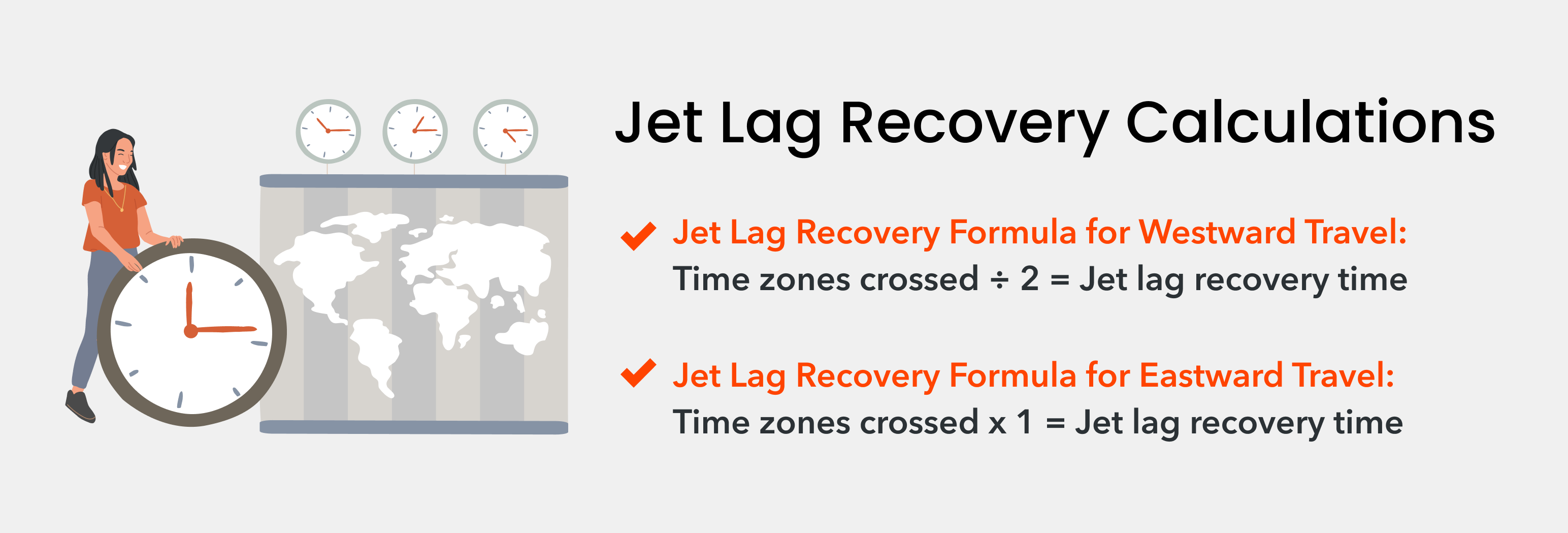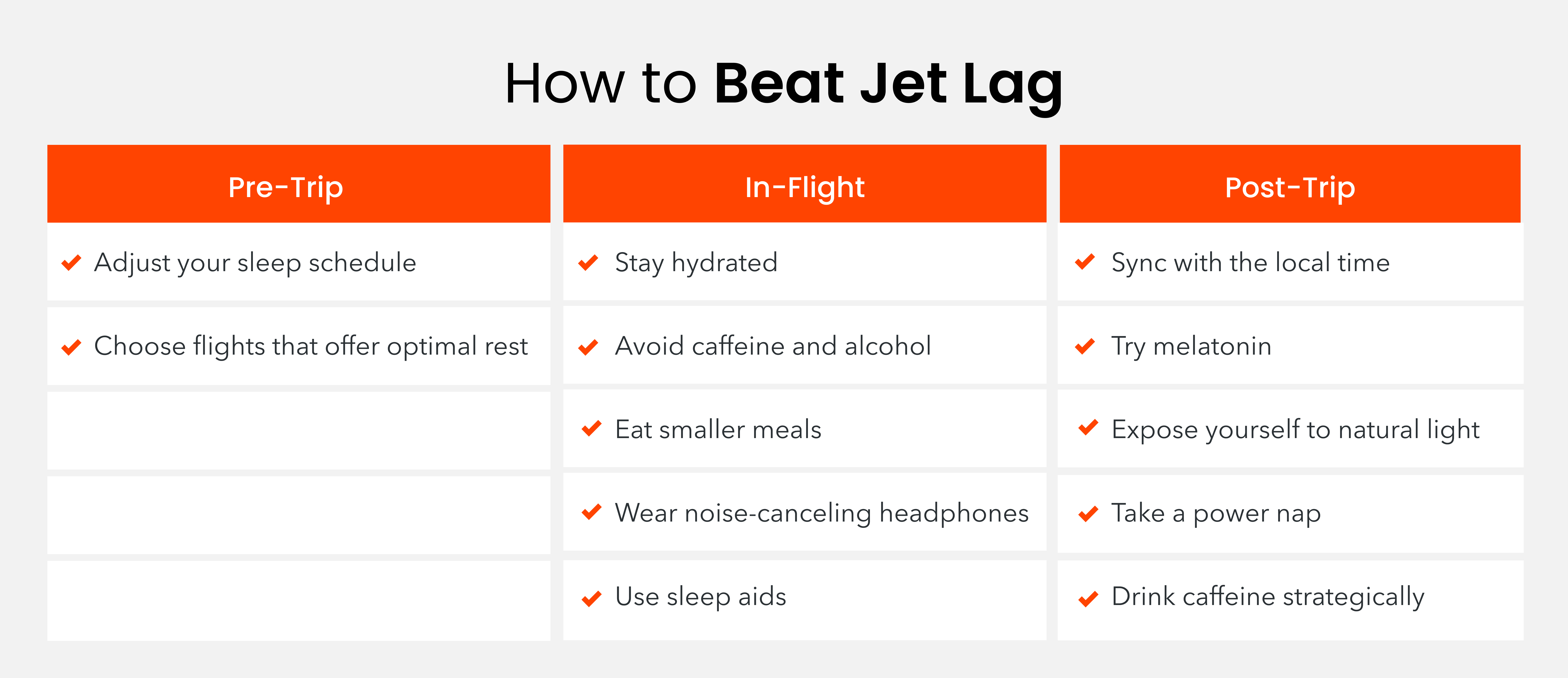Jet Lag Recovery Calculator: How to Calculate Jet Lag

Anyone who has traveled across time zones has felt the effects of jet lag. Whether you’re wondering how to beat jet lag before an important business trip or trying to calculate jet lag recovery time for your upcoming vacation, having the right tools and knowledge can make all the difference. These are among the most common searches travelers make before crossing time zones, and for good reason – nobody wants to spend their precious time away feeling exhausted and out of sync.
Keep reading to find our jet lag recovery calculator to help you beat excessive daytime sleepiness when you should be enjoying your vacation or tackling important business commitments.
- Key Takeaways
- What Is Jet Lag?
- Jet Lag Recovery Calculator: How Long Does Jet Lag Last?
- Best Ways to Beat and Prevent Jet Lag
- Conquering Jet Lag: Using a Jet Lag Recovery Calculator
Key Takeaways
- Your body typically needs around one day for each time zone crossed to fully recover from jet lag, with eastward travel generally causing more severe symptoms than westward travel.
- Pre-trip preparation, including gradual sleep schedule adjustments, can significantly reduce the impact of jet lag.
- Strategic exposure to natural light and proper sleep hygiene in your new time zone are crucial for faster adaptation.
- Hydration, diet, and careful timing of caffeine intake play vital roles in managing jet lag symptoms.
- The direction of travel matters. Eastward travel typically requires more recovery time than westward travel.
What Is Jet Lag?
Jet lag occurs when travel disrupts your body’s natural sleep-wake cycle, known as your circadian rhythm. This temporary sleep disorder, also called desynchronosis, happens because your internal clock stays synchronized to your home time zone while you’re suddenly trying to operate in a new one. The results are similar to the impact of daylight saving time on circadian rhythm.
Your circadian rhythm regulates various biological processes, including:
- Sleep-wake cycles
- Hormone production
- Body temperature
- Digestion
- Cognitive performance
When these rhythms are disrupted, you may experience several symptoms:
- Fatigue throughout the day due to sleep inertia
- Difficulty falling asleep at night in a new time zone
- Impaired physical and mental performance
- Gastrointestinal problems
- Mood changes and irritability
- Difficulty concentrating
Jet Lag Recovery Calculator: How Long Does Jet Lag Last?
How long jet lag lasts depends on a number of factors, with the number of time zones crossed and the direction of travel being the most significant. While the general rule of thumb is one day per time zone crossed, you can use these specific formulas most jet lag recovery calculators use:

Jet Lag Recovery Formula for Westward Travel
Time zones crossed ÷ 2 = Days of jet lag recovery time
Jet Lag Recovery Formula for Eastward Travel
Time zones crossed x 1 = Days of jet lag recovery time
To help you understand how to calculate jet lag time, let’s take a look at an example:
Let’s say you’re flying from New York to London for an important business trip. This means you’ll be traveling through 5 time zones in an eastward direction, so you’ll use the formula:
Time zones crossed x 1 = Jet lag recovery time
- Heading to London: Plan for 5 days of adjustment. If you arrive on Sunday for a Thursday meeting, your body will be fully adjusted just in time for that crucial presentation.
For your return trip, you’ll head west using the formula: Time zones crossed ÷ 2 = Jet lag recovery time
- Return to NYC: You only need about 2.5 days to readjust. If you land on Saturday, you’ll be ready for the office by Tuesday morning.
Best Ways to Beat and Prevent Jet Lag
Beating jet lag starts before you even pack your bags. Think of it as a three-part journey: what you do before your trip, during your flight, and after you land all matter. With the right game plan at each stage, you can help your body adjust faster and spend less time feeling out of sync in your new time zone. Here are a few ways to beat and prevent jet lag:

Pre-Trip Strategies to Minimize Jet Lag
Be sure to start fighting jet lag before you board the plane. Your success in adjusting to a new time zone begins several days before your trip. Taking some simple steps before you leave can help your body handle the time change better and make those first few days in your new destination much more enjoyable.
- Adjusting your sleep schedule: You can adjust your sleep schedule by starting to shift your bedtime 3-4 days before your trip. If traveling east, consider going to bed one hour earlier each night. If heading west, stay up an hour later each night. Even small adjustments help your body prepare. If you need help feeling tired earlier in the day than you’re used to, consider exercising before bed to help release some of the excess energy you might have. Depending on how exercise affects you, you might also use this strategy to help you stay up later. Meditation for sleep can also help your body and mind prepare for sleep when you need to go to bed earlier.
- Choosing the right flights: Book flights that land in the early evening at your destination, and give yourself a buffer day before important events when possible. This gives you enough time to stay awake for a few hours before a natural bedtime. Direct flights are best since layovers can add extra fatigue.
In-Flight Tips to Minimize Jet Lag
Your time in the air is the perfect opportunity to help your body prepare for the changes ahead. Long flights can be challenging, but they’re also a chance to start adjusting to your new time zone. Making smart choices about sleep, food, and drinks during your flight can greatly affect how you feel when you land.
Make your flight time work for you by following these essential strategies to minimize jet lag:
- Staying hydrated: Drink water consistently throughout your flight. Aim for one cup every hour you’re awake.
- Avoiding caffeine and alcohol: Skip the complimentary wine and coffee, as both can disrupt your sleep and dehydrate you further. Stick to water, herbal tea, or electrolyte drinks.
- Eating small meals: Choose lighter options and avoid heavy meals, especially on overnight flights. Your digestive system will thank you, and it’s easier to sleep when you’re not overly full. You can also pack snacks like cherries, almonds, and other foods that contain melatonin to help regulate your sleep cycle during long flights.
- Wear noise-canceling headphones: To minimize distractions from other passengers, announcements, and the sound of the plane, pack noise-canceling headphones that can help you focus on getting adequate sleep during the flight.
- Using sleep accessories: Pack an eye mask, a travel pillow, and natural sleep aids like lavender essential oil or magnesium oil spray for sleep to help you rest more comfortably during the flight.
Along with these in-flight tips for beating jet lag, if you have a long layover, there’s nothing wrong with sleeping in an airport. Find a quiet gate away from foot traffic to rest. Many airports also have dedicated sleep pods or quiet zones.
Post-Arrival Strategies to Combat Jet Lag
The first few days in your new time zone are crucial for getting your body clock back on track. While it’s tempting to just push through the fatigue or sleep whenever your body wants to, having a solid plan for those initial days can help you adjust faster. These strategies will help you get into the local rhythm and make the most of your time, whether traveling for business or pleasure.
- Syncing with the local time: Start living by local time immediately. Eat meals and sleep according to your new time zone, even if your body protests at first.
- Trying melatonin: Consider taking melatonin 30 minutes before your target bedtime in the new time zone. This can help reset your internal clock faster.
- Exposure to natural light: Get outside within two hours of waking up. Natural sunlight is one of the most powerful tools for resetting your body clock.
- Taking strategic power naps: If you’re extremely tired, limit naps to 20-30 minutes, and don’t nap after 3 PM. Taking long naps or sleeping too late in the day can make it harder to sleep at night.
- Using caffeine wisely: Have your coffee in the morning only, and cut off caffeine intake by early afternoon. This helps you stay alert during the day without disrupting nighttime sleep.
Conquering Jet Lag: Using a Jet Lag Recovery Calculator
Understanding and calculating your jet lag recovery time takes the guesswork out of travel planning. Using our simple formulas, you can better prepare for your adjustment period. This knowledge, combined with strategic pre-flight preparation, in-flight habits, and post-arrival routines, helps you take control of your travel experience and minimize jet lag’s impact on your trip.
Make your journey even more comfortable with the right travel accessories. Our Weighted Blanket for travel can help calm travel anxiety and promote better sleep on long flights, while our Memory Foam Pillow can provide crucial neck support whether you’re on the plane or adjusting to a new bed.
Remember, the key to beating jet lag isn’t just knowing how long it will last — it’s having the right tools and strategies to manage it effectively. Browse our collection of sleep-enhancing products today.







